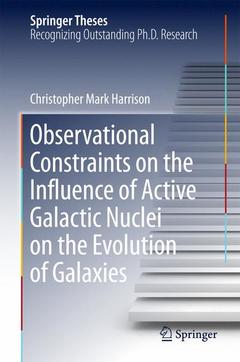Description
Observational Constraints on the Influence of Active Galactic Nuclei on the Evolution of Galaxies, 1st ed. 2016
Springer Theses Series
Language: English
Subjects for Observational Constraints on the Influence of Active...:
Publication date: 02-2016
Support: Print on demand
Support: Print on demand
Description
/li>Contents
/li>Biography
/li>Comment
/li>
This prize-winning Ph.D. thesis by Chris Harrison adopts a multi-faceted approach to address the lack of decisive observational evidence, utilising large observational data sets from several world-leading telescopes. Developing several novel observational techniques, Harrison demonstrated that energetic winds driven by Active Galactic Nuclei (AGN) are found in a large number of galaxies, with properties in agreement with model predictions. One of the key unsolved problems in astrophysics is understanding the influence of AGN, the sites of growing supermassive black holes, on the evolution of galaxies. Leading theoretical models predict that AGN drive energetic winds into galaxies, regulating the formation of stars. However, until now, we have lacked the decisive observational evidence to confirm or refute these key predictions. Careful selection of targets allowed Harrison, to reliably place these detailed observations into the context of the overall galaxy population. However, in disagreement with the model predictions, Harrison showed that AGN have little global effect on star formation in galaxies. Theoretical models are now left with the challenge of explaining these results.
Introduction.- Integral field spectroscopy and spectral energy distributions.- Energetic galaxy-wide outflows in high-z ULIRGs hosting AGN activity.- Kiloparsec scale outflows are prevalent in luminous AGN: outflows and feedback in the context of the overall AGN population.- Storm in a “Teacup”: a radio-quiet quasar with ≈10 kpc radio-emitting bubbles and extreme gas kinematics.- No submillimetre signature of star formation suppression among X-ray luminous AGN.- Conclusions.- Ongoing and future work.
Chris Harrison completed an undergraduate degree in Astrophysics at Edinburgh University before moving to Durham University for his PhD in 2010. During his PhD he published a number of academic papers, was invited to a speak at international conferences and was awarded telescope time on a variety of facilities as lead investigator. Chris was awarded the Keith Nicolas Prize in 2013 and the Physics Thesis Prize by Durham University in 2014. He now continues to develop the research presented in his thesis at Durham University as a Postdoctoral Research Fellow.
Nominated as an outstanding Ph.D. thesis by the Durham University, UK Demonstrates that the currently accepted models of galaxy formation are correct in parts but have parts that are not reproduced by observations Includes a concise review on the properties of supermassive black holes and their predicted role in the formation of galaxies Awarded the Durham University's Physics Thesis Prize and Keith Nicholas Prize for outstanding performance based on the work presented in this thesis Includes supplementary material: sn.pub/extras
© 2024 LAVOISIER S.A.S.




